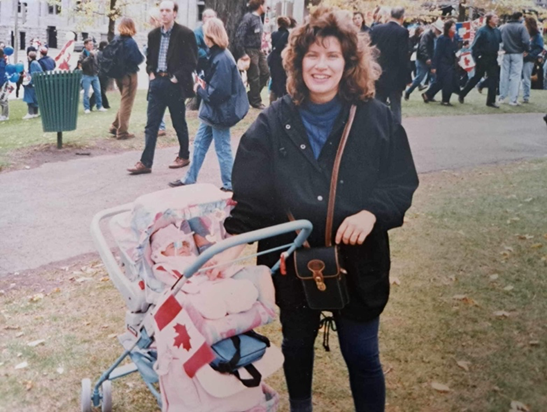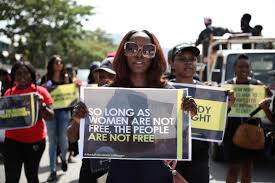In Your Hands


First protest, 1995.
“Lest we forget, a morgue is also a community center” – Ocean Vuong
A good story needs no gimmicks. As English majors, we know this. “Tell it slant” like Dickinson or straight like Bukowski; over TikTok or telephone; in writing or image; in poetry or in motion: a good story needs not gild nor garnish to realize its raison d’etre (Dickinson). Why? Because a good story isn’t a sales pitch. A good story is a form of educated hope.
In a 2015 interview about their book, Disposable Futures, Brad Evans and Henry A. Giroux write that educated hope has two key premises at its core: first, that “agency is a product of education,” and second, that “at the heart of any viable notion of politics,” there is an attempt “to change the way people think, act, feel and identify themselves and their relations to others” (Evans). This kind of hope is informed, not by the solipsistic “self-interest” of neoliberalism but by an agency that comes from a moment of “pedagogical awakening,” when the “rules are [or must be] broken,” when risk becomes necessary, when your bonds to others and tenuous tie to the world are made clear: then, “truth erupts” (Evans, my emphasis). In the face of that eruption of truth, that gash that rends you, reality shimmers, and “thinking the impossible” suddenly becomes obligatory (Evans). The way in which one thinks, acts, feels, and sees themself in the world is changed. It is precisely this sightline – that half-glimpsed vision of the known impossible – that gives educated hope its efficacy; for, as Evans and Giroux hold, the “dystopian realism” of our time can only be addressed through a politics that “use[s] the tools of belief, persuasion and pedagogy as a way of changing how people view the world” (Evans, my emphasis).
A good story produces that site of rend and rendering. How many of us are haunted by the last story we saw ourselves within? Or the first that moved you, offered you a language other than your own? Stories that understand, viscerally, the bonds of our own condition: these are the ones that offer a place where agency can be learned, that walk us to a moment of rupturing “truth” (Evans) and rend us open like “a knife wound in a landscape painting” (Vuong 50). In times of grief or heartbreak, in those moments where we come undone, there is a “cruel optimism,” as Berlant says, where the experience breaks our attachment to the world and the optimism with which we viewed it (Berlant). In that immolating injury, there may be a “wet and bloody” rebirth (Vuong 51), a “pedagogical awakening” (Evans), a necessary glimpse of the impossible beyond a dystopian reality. A good story takes you there, employing a popular pedagogy to strike both at what ails you and what you want. Neoliberal logic and values unconsciously shape our actions, outlook, and approach to understanding one another. Any attempt to displace them must operate at a similar level, and this is precisely what a good story does: it adopts the tactics and appeal of the popular while also operating beyond it, in the same ways that radical love and grief slip beyond, and trouble the project of manufacturing happy citizens. A good story stays with or shapes you – your behaviours, thoughts, desires – without resorting to finger-pointing or chin-wagging[1].
We can tell these stories. We are writers. If we find ourselves asking how we might nurture a radical imaginary among ourselves and others, we need look only to our own hands, mouths, art, intimacies. A pen on the paper is as important as boots on the ground, as important as thinking other than. A clever keystroke can be a fist around a heart, or the means by which to allow someone to see David through stone. I thought the tricky thing about foregoing “the art of the possible” and its opportunistic compromise (Ayers), in our politics and our writing, was knowing where to start. But maybe the question is not where to begin; the question is where I might find my own (r)end.
[1] For self-evident didacticism no longer serves our end; Pilgrim’s Progress is not the arc of our age.
Works Cited
Ayers, Bill. “We Only Move Forward When We Demand the Impossible: An Interview With Bill Ayers”. Interviewed by Alice Kim, Truthout Magazine, 2 Oct 2016, https://truthout.org/articles/we-only-move-forward-when-we-demand-the-impossible-an-interview-with-bill-ayers/. Accessed 18 Mar 2024.
Berlant, Lauren. “Why Chasing the Good Life is Holding Us Back, With Lauren Berlant.” University of Chicago News, 6 November 2019, https://humanities.uchicago.edu/articles/2019/11/why-chasing-good-life-holding-us-back-lauren-berlant#:~:text=Lauren%20Berlant%3A%20So%2C%20cruel%20optimism,optimism%20you%20brought%20to%20them. Accessed 18 Mar 2024.
Dickinson, Emily. “Tell all the truth but tell it slant”. Poetry Foundation, https://www.poetryfoundation.org/poems/56824/tell-all-the-truth-but-tell-it-slant-1263. Accessed 17 Mar 2024.
Evans, Brad and Henry A. Giroux. “Challenging a ‘Disposable Future,’ Looking to a Politics of Possibility”. Interviewed by Victoria Harper, Truthout Magazine, 10 May 2015, https://truthout.org/articles/challenging-a-disposable-future-looking-to-a-politics-of-possibility/. Accessed 17 Mar 2024.
Giroux, Henry A. “Fascist Politics in the Age of Neoliberal Capitalism: Confronting the Domestication of the Unimaginable”. Counterpunch, 11 April 2023, https://www.counterpunch.org/2023/04/11/fascist-politics-in-the-age-of-neoliberal-capitalismconfronting-the-domestication-of-the-unimaginable/. Accessed 18 Mar 2024.
Vuong, Ocean. “Not Even”. Time is a Mother, Penguin Random House, 2022, pp. 45-51.
Read more at By Megan Misztal.
Articles, Cultural Pedagogy, ResistanceRelated News
News Listing

By Maya Phillips ➚
Failure to Reeducate: Perpetuations of Cultural Fascism in Post-War Germany
Articles, Cultural Pedagogy, Public Pedagogy
February 9, 2026

By Rosemary Kasiobi Nwadike ➚
Feminist Miseducation in the Afro-West: Examining (In)Formal Gender Indoctrinations
Articles, Education, Resistance, Social Justice
July 11, 2025

